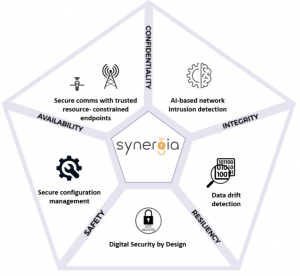How the SYNERGIA project supports COP26 objectives
By Mark Davies: With the UN Climate Change Conference taking place in Glasgow in November 2021, we take a look at how the SYNERGIA project will support the conference’s goals.
COP26 will focus on four major objectives:
- Secure global net zero by mid-century and keep 1.5 degrees within reach
- Adapt to protect communities and natural habitats.
- Mobilise finance
- Work together to deliver
Cities, whilst only cover 3% of the earth’s surface, consume 78% of the worlds energy and produce and account for over 60% of global emissions. The goal of connected places not only enhances the quality of living for its citizens by using data to improve its operations including transportation, public services, utilities and infrastructure, but will also support the environmental changes needed to achieve these aggressive net-zero targets being set over the next decade.
Connecting and integrating services and systems within large scale, multi-tenanted environments, brings huge challenges as organizational boundaries are crossed, not least the security aspects. The Centre for the Protection of National Infrastructure (CPNI) commissioned the PAS 185 framework along with the BSI to specify a “security minded approach” to the implementation and establishment of Smart Cities.
The SYNERGIA project has the potential to help address some of these challenges to support the implementation of a secure smart city environment through its work on the development and implementation of a secure platform, making it easier for central and local governments to achieve their goals.
SYNERGIA, consisting of a consortium led by Toshiba and includes the University of Bristol, Ioetec, Smartia, MAC Ltd and Configured Things, is developing and will demonstrate a novel secure-by-design, endpoint-to-core IoT platform for large-scale networks of low-power resource-constrained devices. This novel solution will help to keep and monitor IoT devices and the data they create secure, whilst connected to the network.
Smart cities can help to

- Reduce the levels of carbon emissions, e.g. Currently, the transport sector makes up 14% of global greenhouse emissions. As more people gravitate towards them, the population of cities are set to grow to over two thirds of the world’s population by 2050. Transportation in urban areas will increase which, if not addressed, will result in a continued rise in emissions. IoT data to improve traffic management, shared transport and improved parking can assist a more efficient movement of a city’s residents and visitors.
- Protect communities & natural habitats with improved environmental monitoring, optimised services like waste collection and by using smart building solutions
- Improve the efficient use of energy and water resources contributing to a more sustainable society.
- Establish safe and secure cross-operational data-sharing to bring disparate stakeholders together to deliver better outcomes for its inhabitants.
To perform these tasks effectively, smart cities will have millions of connected IoT devices but crucially they cannot be implemented fully without effective and robust cybersecurity.
As part of the UKRI’s Strategic Priorities Fund and of the Security of Digital Technologies at the Periphery (SDTAP) programme, SYNERGIA is addressing the challenge of a near-to-market secure and energy-efficient IoT system in resource constrained environments such as smart cities. Incorporating, utilising and combining technologies in a novel way, the SYNERGIA platform, supports the new NCSC’s “Connected Places Cyber Security Principles” to enable key stakeholders to enhance the quality of living for its citizens, improve the co-operation between siloed sectors and to achieve those targets promised at this year’s conference.